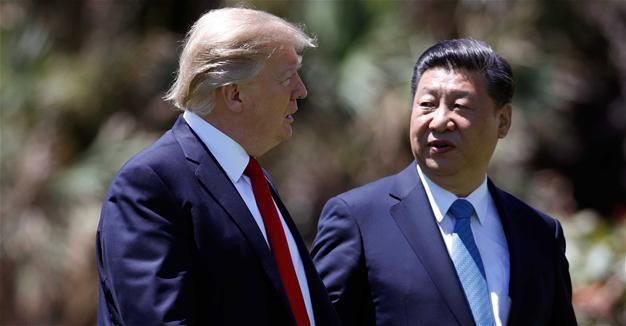Xi urges peaceful resolution of North Korea tensions in Trump call
BEIJING

Chinese leader Xi Jinping has urged U.S. President Donald Trump to peacefully resolve tensions over North Korea’s nuclear program, as the U.S. president touted the power of a naval “armada” steaming towards the Korean peninsula.
The Chinese Foreign Ministry said April 12 the two leaders had spoken by phone, days after Trump sent the aircraft carrier-led strike group to the region in a show of force ahead of a possible nuclear test.
The deployment was followed by a renewed warning that Washington was ready to take on North Korea alone if Beijing declined to help rein in its maverick neighbor’s nuclear ambitions.
Pyongyang has issued a defiant response, saying it was ready to fight “any mode of war” chosen by the United States and even threatening a nuclear strike against U.S. targets.
The saber-rattling has unnerved China, which has made clear its frustration with Pyongyang’s stubbornness but whose priority remains preventing any military flare-up that could bring chaos and instability to its doorstep.
In the call, Xi stressed that China “advocates resolving the issue through peaceful means,” the Foreign Ministry said.
Trump tweeted on April 12 that he “Had a very good call last night with the President of China concerning the menace of North Korea.”
On April 11, the U.S. president tweeted that “North Korea is looking for trouble. If China decides to help, that would be great. If not, we will solve the problem without them! U.S.A.”
A barrage of recent North Korean missile tests has stoked U.S. fears that Pyongyang may soon develop an intercontinental ballistic missile capable of delivering a nuclear warhead to the U.S. mainland.
There is speculation that the country could be preparing a missile launch, or even another nuclear test, to mark the 105th birthday anniversary of its founder Kim Il-Sung on April 15.
In an interview with Fox Business Network, Trump warned: “We are sending an armada. Very powerful.”
“We have submarines. Very powerful. Far more powerful than the aircraft carrier.”
The flotilla includes the Nimitz-class aircraft supercarrier USS Carl Vinson, a carrier air wing, two guided-missile destroyers and a guided-missile cruiser.
“This goes to prove that the U.S. reckless moves for invading the DPRK have reached a serious phase,” a spokesman for the North Korea’s Foreign Ministry said in response.
Chinese Foreign Ministry spokesman Lu Kang said April 12 it was “irresponsible and even dangerous to take any actions that may escalate the tension.”
“All relevant parties should exercise restraint and keep calm, easing tensions instead of provoking each other and adding fuel to the fire,” he said at a regular press briefing.
Pyongyang has so far staged five nuclear tests, two of them last year, and analysis of satellite imagery suggests it could be preparing for a sixth.
China’s Global Times newspaper, which sometimes reflects the thinking of the country’s leadership, said a new test would be a “slap in the face of the U.S. government” and that Beijing would not “remain indifferent.”
“Presumably Beijing will react strongly to Pyongyang’s new nuclear actions,” it said, adding there was increasing popular support for “severe restrictive measures that have never been seen before.”
 Chinese leader Xi Jinping has urged U.S. President Donald Trump to peacefully resolve tensions over North Korea’s nuclear program, as the U.S. president touted the power of a naval “armada” steaming towards the Korean peninsula.
Chinese leader Xi Jinping has urged U.S. President Donald Trump to peacefully resolve tensions over North Korea’s nuclear program, as the U.S. president touted the power of a naval “armada” steaming towards the Korean peninsula.